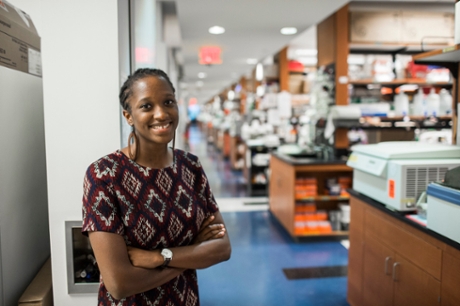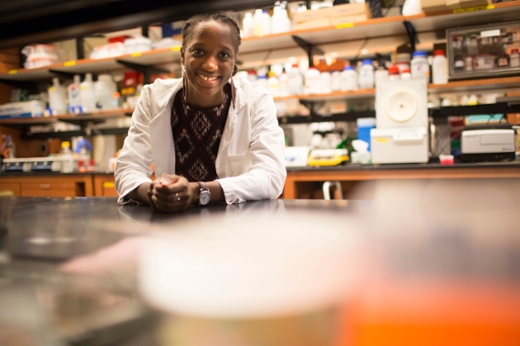This is a two-part feature on graduate students Crystal Grant and Daniel Desautels who were named Christine Mirzayan Science and Technology Policy Fellows by the National Academies of Sciences, Engineering and Medicine.
Part 1: Crystal Grant

From Jan 21 to April 10, graduate student Crystal Grant is participating in the National Academies of Sciences, Engineering and Medicine’s Christine Mirzayan Science and Technology Policy Graduate Fellowship Program in Washington, D.C.
Named in honor of the late NAS Policy Fellow Christine Mirzayan, the fellowship gives graduate students hands-on experience with the development of science and technology policy by way of research projects. Mirzayan herself was a fellow at the Center for Science, Mathematics and Engineering Education. She graduated from the University of California in San Francisco with a PhD in neurobiology and had a deep interest in science’s role in society.
On Aug. 1, 1998, before completing her fellowship to move on to the Association for the Advancement of Science’s Congressional Fellowship, Mirzayan was murdered. Now, in its 23rd year, the namesake Fellowship trains graduate students who share Mirzayan’s ambition.
Crystal Grant is one of those students. A sixth-year PhD student at the Laney Graduate School, graduating in May 2020, Grant studies epigenetics and its relationship with aging under the advisement of professor of genetics at Emory’s School of Medicine Karen Conneely. Grant’s fascination with biology began in high school but her focus on genetics began while an undergraduate studying biology at Cornell University.
“One day, the professor put up this really interesting slide, where fruit flies were growing legs out of parts of their body where they shouldn’t,” says Grant.
The homeotic genes of the flies that control the arrangement of their bodies were reorganized so that the legs grew where the antennae would normally grow.
“I thought that was amazing, and [it] made me want to start researching,” says Grant.
During the last two years of her undergraduate studies, Grant participated in the National Science Foundation-funded Biology Research program. The program aims to prepare underrepresented students for research careers.
After graduating from Cornell in 2013, Grant became a research assistant for the Feinstein Institute. Her time at the institute coincided with the budget sequestration of that year and was impactful in her decision to pursue her PhD.

“I was working in a lab with other scientists and everyone was talking about how this shutdown would negatively impact the NIH and its ability to fund grants,” explains Grant. “I thought then that there needed to be scientists who are comfortable talking to policy makers. That was my final push to get a PhD.”
Since her enrollment in LGS’s Genetics and Molecular Biology program, Grant has had numerous research opportunities while traveling to Switzerland through Emory’s Molecules to Mankind program. By making connections in Switzerland, Grant learned about and accepted the NSF-funded Graduate Research Opportunity Worldwide (GROW) program. Grant also took part in yet another NSF-funded fellowship: The Graduate Research Fellowship Program. Additionally, Grant participated in a Visiting Researcher Fellowship with the Leiden University Medical Center in the Netherlands, staying with the program for a year.
With her rich research experience and a passion for science advocacy, Grant will use the Mirzayan Fellowship to gain experience in science policy. For 12 weeks, she will work on the Committee for Women in Science, Engineering and Medicine to gain a better understanding of the experiences underrepresented women face in tech fields.
“…My PhD is very bioinformatics heavy, [and] I am a black woman…,” says Grant. “I’ve had firsthand experiences in how underrepresented women fare in tech. Getting to contribute to that type of study as well as policy recommendations of how to rectify the issue, is something I’m super excited about.”

